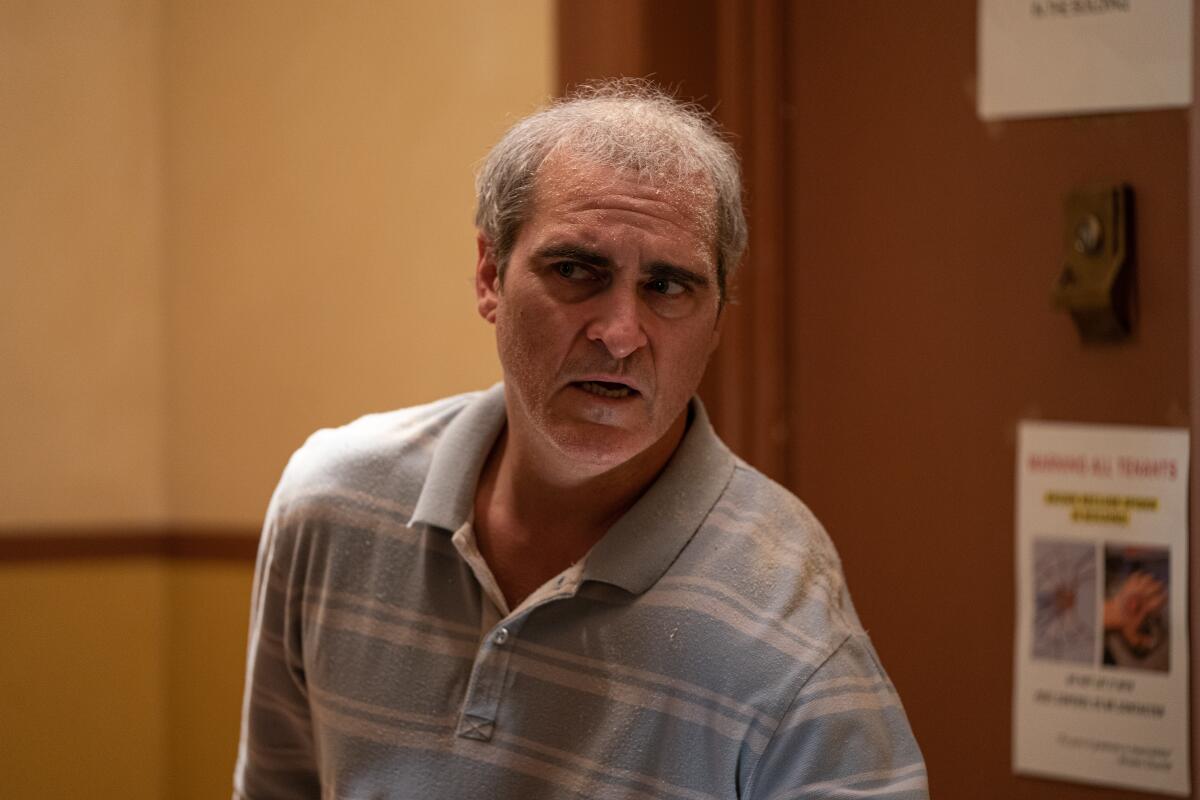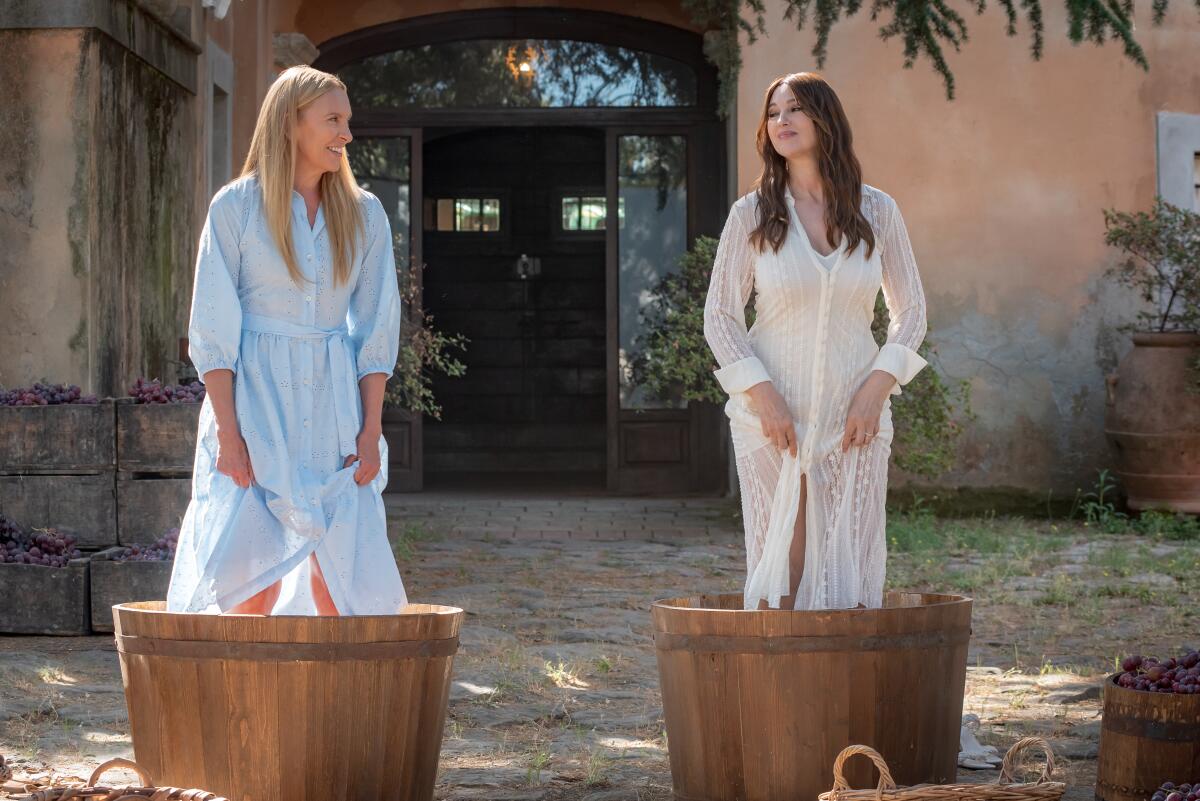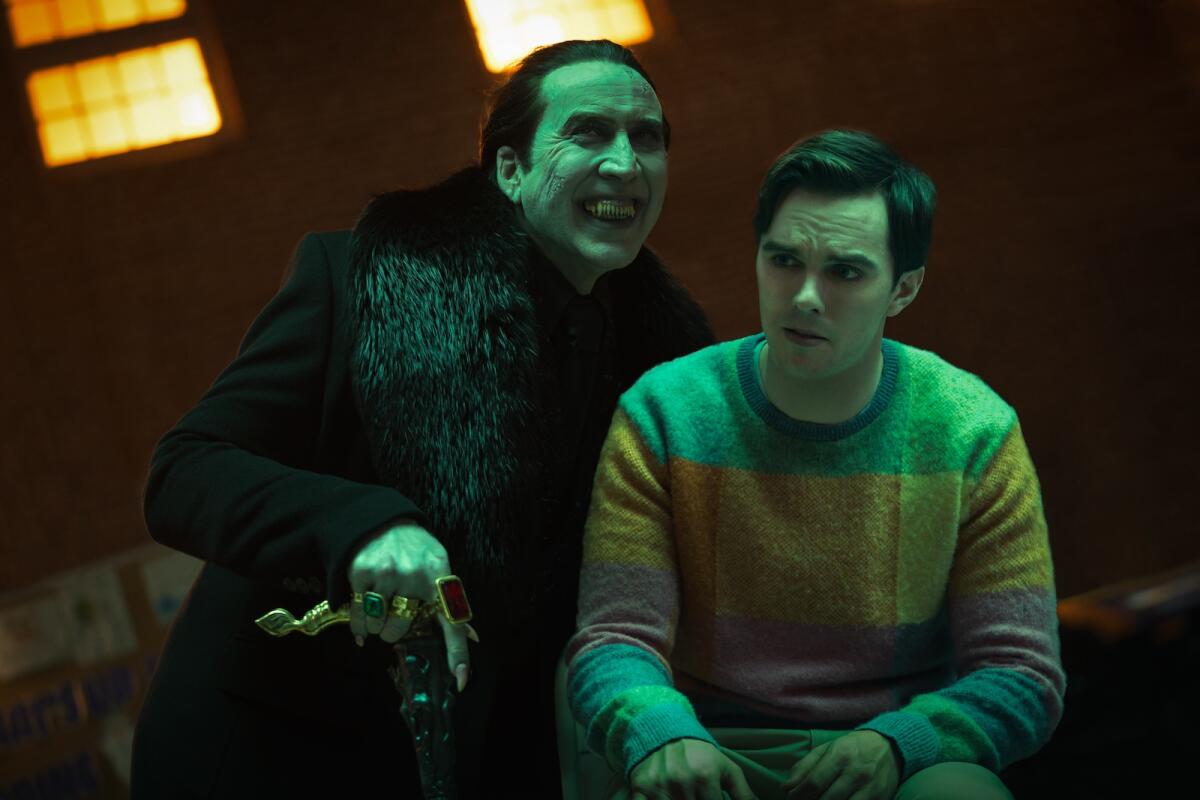Ari Aster’s ‘Beau is Afraid’ and the fears of facing yourself

Hello! I’m Mark Olsen. Welcome to another edition of your regular field guide to a world of Only Good Movies.
Only good movies
Get the Indie Focus newsletter, Mark Olsen's weekly guide to the world of cinema.
You may occasionally receive promotional content from the Los Angeles Times.
TCM Classic Film Festival. This event is an annual treat. This year’s edition opened Thursday with a new restoration of Howard Hawks’ “Rio Bravo” — plus a talk featuring Steven Spielberg, Paul Thomas Anderson and David Zaslav on film preservation — and continues all weekend long. What I have grown to appreciate about the festival is how the idea of “classic film” can now include movies such as 1983’s “Risky Business” right alongside 1941’s “Unfinished Business.” The chance to see these titles in a theater with a deeply engaged audience and often with special Q&A guests is just such a thrill.
‘Flashdance’ at 40. The movie that made Jennifer Beals a star celebrated that milestone this week, and with a new 4K home video release I had the opportunity to talk to the film’s director, Adrian Lyne. He has an astonishingly tight and impactful filmography that also includes “Foxes,” “9 ½ Weeks,” “Fatal Attraction,” “Indecent Proposal” and last year’s “Deep Water.”
Lyne spoke about why he wanted to create such a dynamic visual style for “Flashdance,” with its sparks and smoke and electrifying cabaret dance numbers, all of which had an impact on the emergent platform of MTV and gave many people their first glimpses of breakdancing. As he said, “I guess I knew that the story was thin. And I just wanted to make it look good. And I sort of chose a stylized route, obviously. … So that was just a flight of fancy. As I say, I think people take movies a little bit too seriously sometimes. It’s just a choice.”
‘The Doom Generation’ lives on. Speaking of new classic cinema, a 4K restoration of Gregg Araki’s 1995 film “The Doom Generation,” starring Rose McGowan, James Duval and Jonathan Schaech, hits L.A. this week. An event next Thursday at the American Cinematheque with Araki and Duval is already sold out (though there will be a standby line), but the film is also playing at the Alamo Drafthouse. With its pop-savvy cameos from the likes of Heidi Fleiss and Perry Farrell, the movie captures the knowing irony of the ‘90s like few others, skirting between cynicism, transgression and a youthful sense of energy and momentum that keeps things moving. Having the film back in a glowing restoration in Araki’s preferred cut is cause for celebration.
Enjoying this newsletter? Consider subscribing to the Los Angeles Times
Your support helps us deliver the news that matters most. Become a subscriber.
‘Beau is Afraid’
The new film from writer-director Ari Aster, “Beau Is Afaid” finds the maker of “Hereditary” and “Midsommar” exploring a new kind of horror. Joaquin Phoenix stars as Beau Wassermann, a middle-aged man struggling to make sense of himself and his relationship to his mother amid a phantasmagoria of experiences and memories. The cast also includes Patti Lupone, Zoe Lister-Jones, Parker Posey, Amy Ryan and Nathan Lane. The movie is in theaters now.
For The Times, Justin Chang wrote, “Aster has always had a weakness for treating his characters like chess pieces, moving them toward their grim fates with breathtaking, sometimes agonizing deliberation. That approach worked brilliantly in ‘Hereditary,’ which turned its protagonist’s dollhouse dioramas into a startling visual conceit and a hell of a satanic metaphor. It’s far less effective in an ostensibly more unhinged, unbridled work like ‘Beau Is Afraid,’ where even the most surreal intrusion and the nuttiest non sequitur feels calculated to within an inch of its life. Aster may ultimately be too much the formalist control freak to achieve the crazy, let-it-all-hang-out catharsis he’s chasing, and the elaborate trap he’s engineered for Beau seems to close, finally, on himself. He’s made a guilt trip to nowhere.”
For the New York Times, Manohla Dargis wrote, “‘Beau Is Afraid’ has been built for maximum admiration. And certainly there’s much to respect about Aster’s filmmaking and how he coordinates the movie’s many fast-whirring parts to make another horror show with inner and outer head trauma — one that owes something to Charlie Kaufman’s ‘Synecdoche, New York’ and a great deal to Aster’s regular cinematographer, Pawel Pogorzelski, as well as to some vivid supporting performances. … Yet despite these attractions and in spite of Phoenix’s aura and his focus — and how he plays with the character, opening Beau up a wee bit with flickers of yearning and teasingly humanizing fissures — it is tough to care about a mouse who matters so much less to the filmmaker than the shiny mousetrap where he’s imprisoned you both.
For IndieWire, David Ehrlich wrote, “But the most significant departure from Aster’s earlier stuff can be found in how ‘Beau Is Afraid’ frames its relationship with fear. Here is a movie that defaults to being tense in the service of being funny, as opposed to being funny in the service of creating tension. This thing is only a few seconds old before it invites us to laugh at the perverse understatement of its title, just as Beau himself is only a few seconds old before his terror begins to seep out of the screen even more powerfully than it pulls us toward it. … while Beau himself may not prove to be all that memorable, his fear is foisted upon us in a way that makes it impossible to forget. Few movies have ever so boldly explored how fraught the safety of unconditional love can be in such a cruel world, and even fewer — including Aster’s own ‘Hereditary’ — have been so willing to sit with the irreconcilable horrors of trying to share that love with someone else.

‘Mafia Mamma’
Directed by Catherine Hardwicke, the lighthearted comedy “Mafia Mamma” stars Toni Collette as Kristin, a middle-aged suburban mom feeling stuck in a rut. That is until she is summoned to Italy for the funeral of her estranged grandfather and finds out she is to take over as boss of a powerful Italian crime family, sending her on a journey of self-discovery sort of like “Under the Tuscan Sun” with guns. Monica Bellucci also appears and the movie is in theaters now.
For The Times, Michael Rechtshaffen wrote, “While the fish-out-of-water story might suggest a harmless goof on the sharp 1988 Michelle Pfeiffer comedy ‘Married to the Mob,’ with a more contemporary infusion of female empowerment, the execution struggles from the outset to find a sustainable comedic pitch. … Working from a caricature-leaden script credited to J. Michael Feldman and Debbie Jhoon, Hardwicke continually mistakes shrill slapstick for the type of light, playful satire required of the high-concept set-up. As a result, even though filming took place entirely on location in Italy, the production, complete with its ‘Godfather-esque’ musical cues, somehow ends up packing all the convincing cultural authenticity of Hot Pockets.”
Times columnist Mary McNamara spoke to Hardwicke about her career, from her directing debut on “Thirteen” to making the first “Twilight” film and on to “Mafia Mamma.” As Hardwicke said, “Of course, I could relate to the message of a woman not being as respected as we want to be in our jobs. She’s been people-pleasing all her life when she starts realizing, ‘I’m going to give the orders — that’s an order.’ I loved that arc.”
For the New York Times, Jeannette Catsoulis wrote, “Trite, charmless and entirely without grace, ‘Mafia Mamma’ weaves a wearying string of Mob chestnuts into a shallow empowerment narrative. … Vacillating mainly between randy-tourist energy and “Eek! Blood!” reaction shots, Collette — despite a proven gift for comedy — must serve as the sole load-bearing wall in a house of cards. Mouth and eyes agape, Kristin spends much of the movie gasping variations on ‘Oh my god!,’ whether it’s to note the untimely expiration of a prospective lover or to salute a particularly generous plate of pasta. Filmed in Italy with a mostly Italian cast (including Monica Bellucci as a slinky consiglieri), the story stumbles from one tired setup, one ludicrous shootout, one hackneyed line to another.”
For The Wrap, Tomris Laffly wrote, “It’s not quite the simplicity of the plot that continually weighs ‘Mafia Mamma’ down. At its core it’s a 101-level feminist tale about a woman finally finding herself in the most unexpected of places. On the contrary, there are brief instances in this ‘Baby Boom’ of mob comedies when Collette wins you over despite the odds, reinforcing her knack in fast-paced action and physical comedy with her supple timing. … But the film still can’t rise above its worst instincts on the page, causing one to cringe often.”

‘Renfield’
Directed by Chris McKay from a screenplay by Ryan Ridley, the blood-soaked comedy “Renfield” tells the story of Count Dracula (Nicolas Cage) and his familiar and confidant Renfield (Nicholas Hoult), that is until Renfield decides he wants out of their codependent relationship. The movie is in theaters now.
For Tribune News Service, Katie Walsh wrote, “The plot may be flimsy and disposable, but ‘Renfield’ is gleefully gory and goofy, the kind of movie where a charmingly floppy-haired Hoult jumps on an assassin’s head, exploding his body like a blood-filled water balloon, while cheerily waving at his new friend Rebecca. The red stuff doesn’t so much flow as it projects, geyser-like, from dismembered limbs, our hero wielding severed arms like clubs. … The stylish ‘Renfield’ is a bit of frothy fun. It may be too flip for some, but flippancy isn’t the issue — it’s the flimsiness. Hoult and Cage sell the toxic odd-couple dynamic well, but a sturdier story is required to fully support their performances, especially Cage’s operatic Dracula, who delights in terrorizing his foppish familiar. ‘Renfield’ dutifully delivers the goods — and a few therapist-approved lessons about codependent relationships too — but unfortunately, it’s lacking a bit of bite.”
For the New Yorker, Richard Brody wrote, “As logically as ‘Renfield’ is assembled, it also feels backfilled, built not as a story that contains its own mainspring of dramatic necessity but in the conditional tense, suggesting what kind of movie based on its one-line premise might be or could be made. Its tentativeness is palpable from the very start: an extended montage that piles up backstory and introduces Dracula — or, rather, Cage — and which comes off as a film-editing rescue mission, one that can jump-start the movie with a bang of action and a blast of star power.”
For the Washington Post, Ann Hornaday wrote, “It’s all an extravagant, occasionally amusing jape, and perfectly suited to Cage’s acting style, which has always been more suited to old-school German expressionism than the subtleties of American naturalism. Cheesy, strident, ridiculous and sometimes disarmingly, stupidly funny, ‘Renfield’ doesn’t go for the jugular as much as give it a playful and quickly forgotten love bite.”
For IndieWire, Kate Erbland wrote, “It’s all an approximation of fun, mirth in tiny portions, amusement of the thinnest variety. Is Cage having fun? Yes. Does Hoult deserve a more meaty script? Definitely. Is it fun to cheer when heads explode and Hoult beats multiple men to death with a pair of arms he ripped off one dude? Absolutely! But that’s all stuff that sounds fun on paper, but is utterly limp in execution. There’s nothing juicy here, nothing really new, a bloodless spin on what should have been a tasty new take.”

Only good movies
Get the Indie Focus newsletter, Mark Olsen's weekly guide to the world of cinema.
You may occasionally receive promotional content from the Los Angeles Times.




